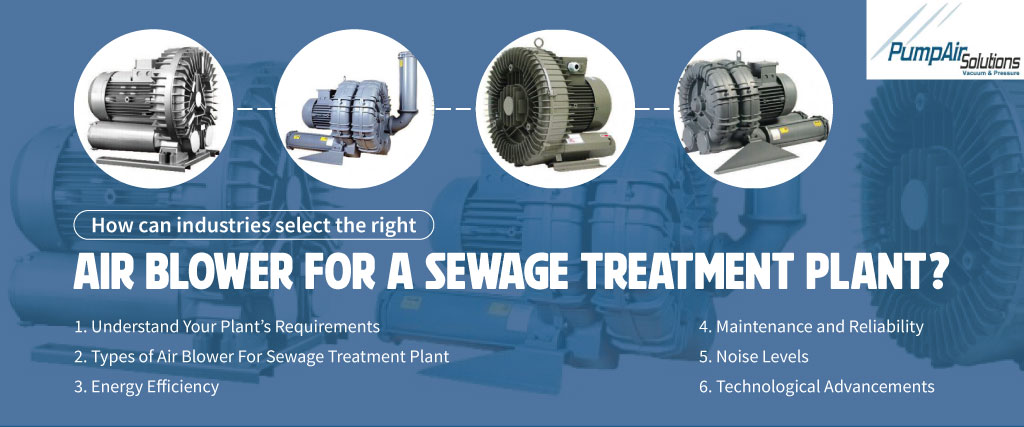Selecting the ideal Air Blower for Sewage Treatment Plant is essential to get successful biological treatment, efficient aeration, and overall operational performance. There are many different types of air blowers accessible, each with special features and benefits. Hence, it is important to understand some important factors that can affect your decision-making process. In this blog, we have provided a comprehensive overview that will help you make a well-informed choice.
1. Understand Your Plant’s Requirements -
It is essential to consider the specific requirements of your Air Blower for Sewage Treatment Plant before choosing one. This includes figuring out the necessary air flow rate, pressure, and aeration process type. Specifications for air blowers may vary depending on the type of treatment method being used, such as oxidation ditches, biofilters, or activated sludge systems. Precisely evaluating these requirements will ensure that the selected blower can fulfil the operating standards without exceeding or falling short of expectations.
2. Types of Air Blower For Sewage Treatment Plant -
Sewage treatment facilities employ a variety of air blower types, each having unique features:
1. Positive Displacement Blowers: -
These blowers include screw and rotary lobe blowers that maintain a steady airflow even when pressure fluctuates. They are highly reliable, effective, and perfect for applications needing constant aeration.
2. Centrifugal Blowers: -
Centrifugal Blowers are highly effective variable flow rate equipment perfect for applications requiring large amounts of air at low pressure. They are usually used in large treatment facilities.
3. Turbo Blowers: -
Turbo blowers are well known for their exceptional energy economy and capacity to provide precise airflow and pressure by using modern technology. This Air Blower for Sewage Treatment Plant offers quality performance and energy efficiency.
3. Energy Efficiency -
Energy consumption is one of the main operating expenses of Air Blower for Sewage Treatment Plant. Choosing an energy-efficient air blower can result in significant savings throughout the blower’s life. Therefore, businesses should look for blowers with features like variable speed drives (VSD), which minimize energy consumption by adjusting the blower’s speed according to the air demand. Blowers that use less energy not only save running expenses but also help preserve the environment.
4. Maintenance and Reliability -
The reliability of an Air Blower for Sewage Treatment Plant is essential to avoid disruptions during the treatment process. Think about blowers renowned for their reliability and minimal maintenance needs. Features like oil-free operating, sturdy construction, and advanced monitoring systems can increase reliability. Moreover, ease of maintenance can also save downtime and maintenance costs. Examples of this include quick-access panels and fewer moving parts.
5. Noise Levels -
Noise is a major issue since the Air Blower for Sewage Treatment Plant is usually situated close to residential areas. Industries must select industrial air blowers designed to operate quietly. Moreover, blowers that minimize noise disruptions to the surrounding neighbourhood, comply with noise standards, or include sound-dampening features can all help a calmer working environment.
6. Cost Considerations -
Even if the air blower’s initial cost is an important factor, the total cost of ownership (TCO) must be considered. This covers the purchase price, estimated lifespan, installation costs, energy usage, and maintenance costs. TCO analysis can help with selecting a cost-effective solution and gaining a better understanding of the long-term financial implications.
7. Technological Advancements -
Sophisticated Air Blower for Sewage Treatment Plant is equipped with innovative features to improve monitoring and performance. Functions like remote monitoring, real-time data analytics, and integrated control systems can streamline processes and offer valuable data on the blower’s performance. Moreover, these developments can result in increased sewage treatment process control, less downtime, and increased efficiency.
Final Thoughts -
The overall performance, energy consumption, and operational efficiency are all impacted by the choice of your Air Blower For Sewage Treatment Plant. Understand your unique industrial requirements, consider different blower types, ensure energy efficiency, reliability and minimal maintenance, address noise concerns, analyze costs, and embrace technological advancements. This will help you make an informed decision beneficial for your industry and environment.
Therefore, purchasing the appropriate Air Blower for Sewage Treatment Plant ensures efficiency and sewage treatment and promotes sustainability and long-term cost savings. Moreover, as technology continues to grow, keeping up with the most latest developments and innovations in air blower technology can help you maintain both environmental compliance and maximum plant efficiency.
Side Channel Blowers is the top Side Channel blower manufacturer and supplier of a wide range of industrial air blowers within Australia. We deliver effective Air Blower for Sewage Treatment Plant and Side Channel Blowers from FPZ Side Channel blowers, ESAM Side Channel Blowers, Busch Blowers, and Elmo Rietschle Side Channel blowers. To learn more about our products and their pricing, visit our website at Side Channel Blowers.

